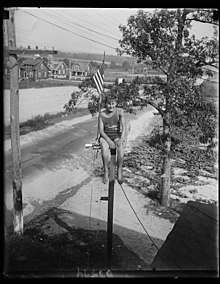Pole sitting
Pole sitting is the practice of sitting on top of a pole (such as a flagpole) for extended lengths of time, generally used as a test of endurance. A small platform is typically placed at the top of the pole for the sitter. Led by the stunt actor and former sailor Alvin "Shipwreck" Kelly, flagpole sitting was a fad in the mid-to-late 1920s, but mostly died out after the start of the Great Depression.
%2C_Bestanddeelnr_930-3639.jpg)
History and 1920s fad
Pole sitting is predated by the ancient ascetic discipline of stylitism, or column-sitting. St. Simeon Stylites the Elder (c. 388–459) of Antioch (now Turkey) was a column-sitter who sat on a small platform on a column for 36 years.[1]

Flagpole sitting was a fad in the mid-to-late 1920s. The fad was begun by stunt actor and former sailor[2] Alvin "Shipwreck" Kelly, who sat on a flagpole, either on a dare by a friend[3] or as a publicity stunt.[2] Shipwreck's initial 1924 sit lasted 13 hours and 13 minutes. It soon became a fad with other contestants setting records of 12, 17 and 21 days. In 1929, Shipwreck decided to reclaim the title. He sat on a flagpole for 49 days in Atlantic City, New Jersey, setting a new record.[4] The following year, 1930, his record was broken by Bill Penfield in Strawberry Point, Iowa who sat on a flagpole for 51 days and 20 hours, until a thunderstorm forced him down. Flagpole sitting in the 1920s was a major part of the decade.
For the most part, pole sitting was confined to the 1920s, ending with the onset of the Depression.[5]
Post-1930 incidents and records
- In 1946, Marshall Jacobs, a 37-year-old Ohio resident who was trying to revive the fad, married his fiancée Yolanda Cosmar atop a flagpole with a roost, and a photograph of them kissing gained wide attention.[6]
- From 1933 to 1963 Richard "Dixie" Blandy claimed various records as champion at 77, 78 and 125 days until he died in 1974 when the pole on which he was sitting collapsed.[7]
- In 1964 a record of 217 days was set in Gadsden, Alabama by Peggy (Townsend) Clark.[8]
- From November 1982 to 21 January 1984 (439 days, 11 hours, and 6 minutes), H. David Werder sat on a pole to protest against the price of gasoline.[9][10]
Television
- On the classic game show What's My Line hosted by John Charles Daly, a flagpole sitter is the first guest on the July 3, 1955 episode.
See also
References
- "Catholic Encyclopedia: St. Simeon Stylites the Elder". Newadvent.org. 1912-02-01. Retrieved 2009-10-17.
- Baker, Danny. "Shipwreck for ever in pole position." The Times (United Kingdom) 21 Aug. 2002: Newspaper Source Plus. Web. 22 Dec. 2011.
- Long, Mark A., and Jim Fee. Bad Fads. Toronto: ECW, 2002. p. 17 Ebrary. Web. 22 Dec. 2011.
- "Atlantic City's Historic Steel Pier at Trump Taj Mahal Hits the Auction Block on August 25th." PR Newswire US. 29 June 2011: Regional Business News. Web. 22 Dec. 2011.
- "Flagpole Sitting - The Bad Fads Museum". Archived from the original on October 4, 2007. Retrieved 2012-02-05.CS1 maint: BOT: original-url status unknown (link)
- "Behind the Picture: Love Atop a Flagpole". Time Magazine. 1946.
- "Dixie Blandy Papers, Special Collections and Archives" (PDF). Wright State University.
- Goodson, Mike. "Pole-sittin' Peggy". The Gadsden Times. Retrieved 12 April 2012.
- "They Run For Office And Lose—Again And Again | Washington Bureau". Mgwashington.com. 2008-05-02. Archived from the original on July 14, 2011. Retrieved 2011-05-20.
- "The most unusual name on the 2008 ballot". Bay Buzz. 2008-06-26. Archived from the original on January 16, 2010. Retrieved 2011-05-20.